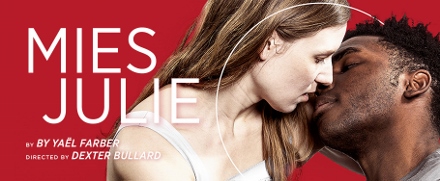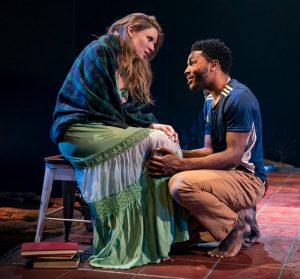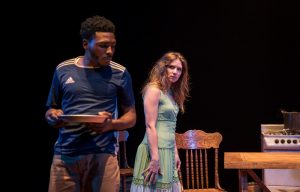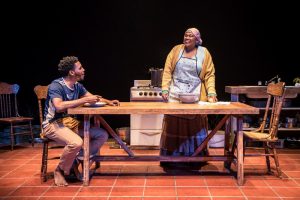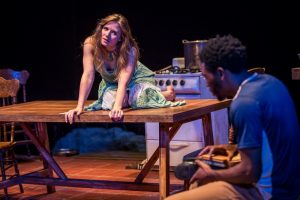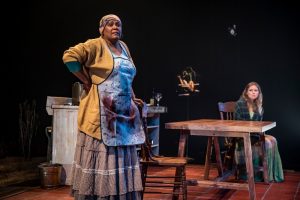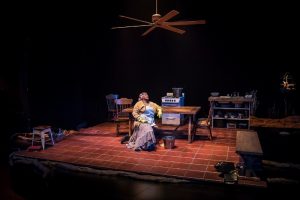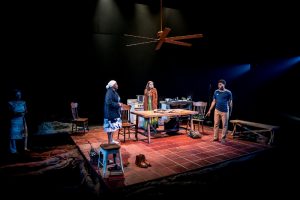STRINDBERG SET IN SOUTH AFRICA
Yes, it’s Mies Julie, not Miss Julie, and it’s by Yaël Farber, not August Strindberg. And that makes a monstrous difference. Repurposed to depict a different divergence between two star-crossed and mismatched lovers, reset in an uprooted country torn between the curse of apartheid and the uncertainty of nationhood, Strindberg’s drama scorches and sears in a bold new way. But, as in 1888, audiences inevitably seek a point to the pain: We need to know that this savage sexual encounter is more than just the world’s worst one-night stand.
Now playing Chicago’s Victory Gardens Theater in an uncompromising staging by Dexter Bullard, Mies Julie is a 70-minute showdown. It presents simultaneous clashes on a lot of levels — between the partners’ past and future, between two races and two sexes, and most of all between love and hate.
The sweltering setting is the kitchen of a prosperous South African farm near the Kalahari Desert. Marking a seminal break from the past, the pivotal date is April 27, 2012 — 18 years after the end of apartheid. (“Freedom Day” honors the anniversary of the country’s first open election.) The improbable, interracial couple is John (Jalen Gilbert), a farm worker who has grown up in peonage on the estate, and his childhood friend and social superior Mies Julie (Heather Chrisler), haughty daughter of the white Afrikaaner owner.
The third character is Christine (Celeste Williams), the cook and John’s mother, a religious, resigned, lifelong chattel: Christine remains psychologically chained to the kitchen, haunted by a still-active tree beneath the floor that grows from the bones of covered-up loved ones. Completing the quartet is the mysterious and mute Ukhokho (T. Ayo Alston), a possible embodiment of the ancestors.
What Strindberg (who has been lambasted as a misogynist) depicts on this fetid Midsummer Eve is a brief suspension of class distinctions, affected by the leveling of liquor and sex. Julie’s valet Jean is a sophisticated, educated and traveled charmer. Christine — Jean’s fiancée, not his mother — is also unaware of the fatal tryst going on inside her kitchen. The core connection across 130 years is the carnal one. But, however intimate sex seems, it breaks no barriers and builds no bonds. In both one-acts the ending is violent and hopeless. Given the gulf between these lovers, all prospects are impossible.
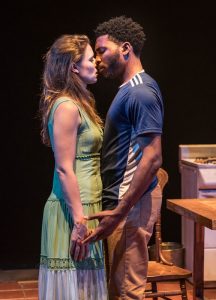 In “Master Harold” ’¦and the Boys, Athol Fugard shows how growing up in a segregated South Africa poisons even a lifelong friendship between a surrogate son and a father figure. Farber raises the social stakes in his story: For Mies Julie, who secretly craves the privileges of a man (black or white), the prospect of pregnancy is far worse than the risk of sex and there’s no difference between abortion and suicide.
In “Master Harold” ’¦and the Boys, Athol Fugard shows how growing up in a segregated South Africa poisons even a lifelong friendship between a surrogate son and a father figure. Farber raises the social stakes in his story: For Mies Julie, who secretly craves the privileges of a man (black or white), the prospect of pregnancy is far worse than the risk of sex and there’s no difference between abortion and suicide.
Of course, (im)pure passion plays an incendiary part in this cross-cultural intercourse. But with John and his employer’s heiress it’s equally a power struggle for the past as much as the future. Julie’s mother killed herself in this kitchen, and like the bones beneath the tree, that blood casts a constant stain. Like the black mamba that Christine imagines as an agent of retribution, what’s to come is inextricably bound up in a ceaseless quarrel over the land. Both lovers demand to know: Who are the real squatters? But no “truth and reconciliation” happens here, just the implacable dynamics of gender, class and race, three treacherously shifting pivots of power.
For Strindberg Miss Julie is a “man-hating half-woman”: She incarnates a war between the sexes that neither can win. Farber particularizes her much more — as a feckless creature of unearned entitlement. Her supposed birth right is a subservience that only sex can undermine: Chrisler plays her with clueless cunning, a lustful lady for whom acts have no consequences and who’s not above lying about rape to get her way.
Representing a multi-racial, post-Mandela, born-again nation, John is caught on the cusp of change. Both cowed and infuriated by the sight of the boots of his “master,” John alternately resists and succumbs to ancient resentment, a curse and a conflict that desire only enrages: Powerfully, Gilbert forces his frustrations into full fury. Caught between, Williams’ achingly anguished Christine only wants peace from her demons.
No question, Farber’s appropriation of Strindberg’s “original sin” is a tricky feat: As an act of repossession without a contract, it’s inevitably less vital than its source. But it certainly “continues the conversation,” as they say. If the naturalistic Swedish playwright imagined that social inequality dooms his impossible mates, for Farber race and class fuse into a bridge-defying gap that swallows them both.
What we leave behind — or choose to take with us — is the play’s hopeless (lack of) resolution. Because Mies Julie and John are fated to destroy each other, they forfeit the future. Take that as — and where — you will.
photos by Liz Lauren
Mies Julie
Victory Gardens Theater, 2433 N. Lincoln Ave
Tues-Fri at 7:30; Sat at 3 & 7:30; Sun at 3
ends on June 24, 2018
for tickets, call 773.871.3000 or visit Victory Gardens
for more shows, visit Theatre in Chicago
